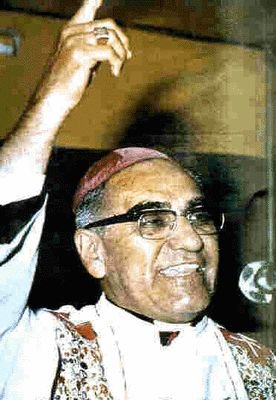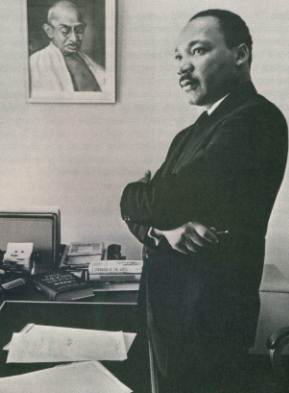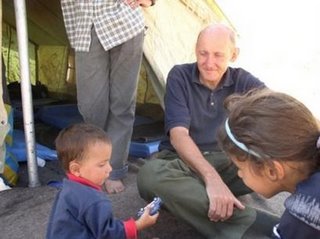 Frank Cordaro climbs over the gate at the STARC Armory near Des Moines to protest of the presence of Iowa National Guard troops in Iraq in November 2004.
Frank Cordaro climbs over the gate at the STARC Armory near Des Moines to protest of the presence of Iowa National Guard troops in Iraq in November 2004.Good Friday – April 14, 2006
DEATH IS UNIVERSAL AND PERSONAL
Death for us humans is both universal and personal. It is universal because no one gets off the planet alive. It is also personal because each one of us must experience our own death. No one can die our deaths for us.
My first real experience of death came with the death of my father, George. There was no one in the world I loved more than my dad. He was a teacher, coach and athletic director of Dowling Catholic High School at the time when it was the all-boys catholic high school in Des Moines. His whole life was directed to serving and loving his God, his family and his work at Dowling, in that order. I cannot say too many good things about my dad. He was honest, true and a friend to all. He lived his life passionately with a strong sense of purpose and meaning. He was a gentle man with a contagious spirit. I lived my life to please him. He was that good.
When my dad died of a heart attack my senior year at Dowling on Easter Sunday morning April 6, 1969, my world collapsed. As he lay dying in a room at Mercy Hospital they let his three oldest children go in to see him, one at a time. There was no time left for my three younger brothers to see him. I was the last in the family to see him alive, though he was barely alive at that time. All I can remember saying to him was "Don't worry Dad. God will take care of everything." I must have said this at least three times. All my dad could do was look at me and let his eyes speak. In them I saw his fear, his love and his understanding.
It took me years to sort out the many layers of meaning of my father's death. For a very long time I had a real fear of death. It was not until I was a parish priest that I acquired some comfort around death. Being a parish priest afforded me rich and meaningful experiences with the dying. As a priest I could walk into the middle of a dying person's last days, hours and even minutes and ask the most important and personal questions. To ask a dying person if they are ready to die is to ask a person to open themselves to the deepest things in their hearts. It was often the most moving and humbling thing I did as a priest, revealing to me, through others, what true faith in God is all about.
My second most personal encounter with death was my own near death experience of dying from a heart attack in September 2001. It was a killer heart attack, the pain was unbearable. I was lucky I was five minutes away from the hospital. Another 10 minutes getting to the hospital would have cost me my life.
I remember being in great pain as I was being taken to the operating room. There was no time to pray or think or do anything to prepare. I managed at my last moment of consciousness to give myself over to God. When I awoke after surgery, I was still in great pain, drugged out on meds, with lots of tubes and needles in my body. As I gradually got my wits back, the first thing I realized was that for me death had ceased to be a metaphor. It had no meaning for me. All I remember was coming out of a kind of darkness, though calling it darkness is saying too much. It was more like nothingness. It was weeks before I was able to use words to explain this experience and months before I thought in metaphoric terms about death again.
MY GOD, MY GOD WHY HAVE YOU FORSAKEN ME? (Mark 15:34)
Nobody knows for certain what was on the mind of Jesus when he was dying on the cross. No one ever will. I am certain I know what was not on his mind. I do not believe he was thinking he was the sacrificial blood offering demanded by his Father, God, for the sins of the world. All such sacrificial language used to give meaning to Jesus' death came after his death and resurrection, a kind of theological "Monday Morning Quarterbacking", where the meaning for events is given in hindsight.
 Furthermore, I do not believe that Jesus' goal in life was to get nailed to a cross. Certainly, the fact that he foresaw in his continued public speaking and acting out of the Kingdom of God's demands that he was putting his life in jeopardy was no great divine insight. Gandhi, Martin Luther King and Oscar Romero all foresaw their probability of being killed for their peace and justice work. None of these modern martyrs lived to die, not do I believe did Jesus. Jesus' crucifixion was a consequence of his being faithful to his mission and call from God. Jesus set out in his life to correct the faults of his own tradition; in the process he realized the old covenant based on law could not be fixed. What was needed was a new covenant based on love. This covenant was based on a truer understanding of the nature of God and God's relationship to humanity. This covenant's two working principles were unconditional love and unlimited forgiveness. Jesus believed that God operated under these principles and that human beings could do the same. Jesus instinctively knew that worldly powers would violently resist this new covenant and he knew he risked his life to follow it as would others who joined him.
Furthermore, I do not believe that Jesus' goal in life was to get nailed to a cross. Certainly, the fact that he foresaw in his continued public speaking and acting out of the Kingdom of God's demands that he was putting his life in jeopardy was no great divine insight. Gandhi, Martin Luther King and Oscar Romero all foresaw their probability of being killed for their peace and justice work. None of these modern martyrs lived to die, not do I believe did Jesus. Jesus' crucifixion was a consequence of his being faithful to his mission and call from God. Jesus set out in his life to correct the faults of his own tradition; in the process he realized the old covenant based on law could not be fixed. What was needed was a new covenant based on love. This covenant was based on a truer understanding of the nature of God and God's relationship to humanity. This covenant's two working principles were unconditional love and unlimited forgiveness. Jesus believed that God operated under these principles and that human beings could do the same. Jesus instinctively knew that worldly powers would violently resist this new covenant and he knew he risked his life to follow it as would others who joined him. WAS JESUS' SUFFERING SINGULAR OR UNIVERSAL?
WAS JESUS' SUFFERING SINGULAR OR UNIVERSAL?The way we answer this question will greatly determine our understanding of who Jesus is. There are many who believe Jesus' suffering and death was a singular event in human history. (Mel Gibson's movie, The Passion of the Christ, comes to mind as an example of this thinking.) Because Jesus was taking on the sins of the world, his suffering and death are unmatched by any other human suffering and
death. Though countless others had suffered the same fate as Jesus and countless more have suffered longer and more gruesome forms of torture and death, none can compare to Jesus' suffering and death. This line of thinking placed in our modern context is not helpful. It is hard to take Jesus' humanity seriously if you believe that Jesus' suffering and death were singular and beyond all ordinary human suffering.
The hardest thing facing the New Testament authors was convincing people of their time that Jesus was the Son of God and there were no others beside him. That God had sons was not a problem for first century people. Greek mythology is full of stories that involve the father god Zeus' many affairs with human women and the various 'sons' that were produced (e.g., Hercules, Dionysius, etc.). In addition, everyone knew that god had a very famous 'son.' They knew his name and where he lived. His name was Caesar and he lived in Rome. Convincing people that a poor Jewish peasant, a vagabond preacher who fell afoul with the Romans and got crucified in Jerusalem, had a greater claim to God's sonship than Caesar greatly affected how the New Testament was written, especially the four gospels. The problem we have today is exactly the opposite. For most professing Christians, the divine side of Jesus is a given, it's his human side that is not seriously believed.
One way to take Jesus' humanity seriously is to understand his suffering and death as all too common and universal, a reality that people lived with in Jesus' day and in our own. The truth is anywhere the poor and oppressed exist we'll find violent political repression. This is a common human experience. Just as Jesus did, we can find people who are nonviolent, justice-seeking peacemakers in these poor and oppressed communities. Many of these people end up suffering from the same violent political repression that dominates the poor and the oppressed. This is how the saints and martyrs throughout history have joined in Jesus' redemptive work to heal and restore our broken world.
This does not mean only the suffering that ends in martyrdom is nredemptive. All human suffering can serve a redemptive purpose. However, the suffering that comes with those who die for the faith and/or die as a result of their nonviolent resistance to injustice and oppression represents the normative kind of suffering in the manner that Jesus suffered. The Catholic Church recognizes this hierarchy of redemptive suffering when it officially certifies a person a martyr who died for the faith.

Gandhi, Martin Luther King, Jr. and Romero are good examples of how redemptive suffering works today. After each one of their deaths, countless people were inspired by their lives and have tried to follow their example. These are examples where true blood sacrifice can be redeeming.
Not all blood sacrifice inspires people to do "good." The "powers" and "principalities" (Rom 8:36) are also sustained by blood sacrifice. These are the people who believe in redemptive violence as a means to serve God and country. In this regard, the 2000 plus U.S. soldiers killed in Iraq and Afghanistan and the suicide bomber martyrs from the middle east die for the same theological reasons, only on different sides of a win/lose struggle.
 When I think of the Middle East, the lands of the Bible, and all the violent forces at work there and our own U.S. contribution to the violence, my heart breaks. Is it as hopeless as it seems? Only with New Testament eyes do I see signs of hope. When I call to mind two Americans who tried to bring the nonviolent love of Christ to the region at the cost of their lives -- Rachel Corrie and Tom Fox -- I say, "Amen!" Rachel Corrie was run over and killed by a U.S. made bulldozer trying to stop the Israeli Government from destroying a Palestinian family's home. The body of Tom Fox, who was one of the four Christian Peace Makers who were kidnapped . . . was found in February . . . with fatal bullet wounds.
When I think of the Middle East, the lands of the Bible, and all the violent forces at work there and our own U.S. contribution to the violence, my heart breaks. Is it as hopeless as it seems? Only with New Testament eyes do I see signs of hope. When I call to mind two Americans who tried to bring the nonviolent love of Christ to the region at the cost of their lives -- Rachel Corrie and Tom Fox -- I say, "Amen!" Rachel Corrie was run over and killed by a U.S. made bulldozer trying to stop the Israeli Government from destroying a Palestinian family's home. The body of Tom Fox, who was one of the four Christian Peace Makers who were kidnapped . . . was found in February . . . with fatal bullet wounds.
These two U.S. peacemakers hardly match the 2000 plus deaths of U.S. soldiers sent to make war in the Middle East. Then I'm reminded that Jesus died alone on the cross, abandoned by all his friends and disciples and that the Roman Empire and its heirs are firmly in control of our world despite the truth of the first Easter Sunday Resurrection claims. This is the case despite a long litany of saints and martyrs known and unknown. Then it dawns on me just how big a leap of faith a person has to make to truly believe in Jesus' new covenant of love.
* * *
A former priest, Frank Cordaro is now serving a six month federal sentence (his most recent of several) for nonviolent direct action. He and other members of the Catholic Worker community regularly protest against nuclear weapons and the war in Iraq, which they oppose on the basis of their faith and their understanding of the meaning and value of the teachings of Jesus.
No comments:
Post a Comment